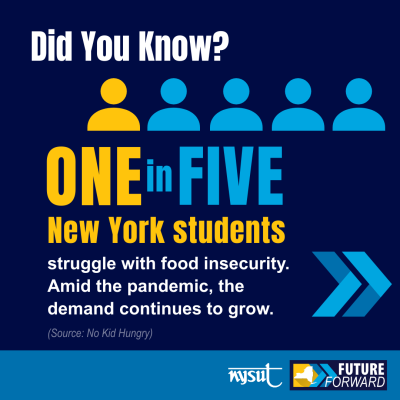 Public Schools as the Center of Our Communities
Public Schools as the Center of Our Communities

Union members across the state regularly coordinate food and supply drives for needy families. Above, more than 700 bags containing chicken, dairy items, produce and other staples are prepared for a drive-thru event held Dec. 16 at NYSUT headquarters in Latham.
Food Insecurity Challenges Schools, Families Across New York
by Liza Frenette
SHARE:
Hungry kids — pre-K through college — struggle to learn. Not having enough to eat can make students lethargic, irritable, unfocused and even miss school.
In his own informal polling, elementary school teacher Jason Carter found half of his students would have gone without breakfast if it had not been available at school. During the pandemic, breakfast and lunch have been free for all students in Wayne Central Schools, but that practice will not continue, said Carter, a member of the Wayne Teachers Association.
Knowing that food insecurity has only been exacerbated during the pandemic, NYSUT wants federal legislation to permanently provide universal free meals to all students, including during the summer and after school.
“I have noticed the positive benefits. In the past, especially with schedules like this year where my class is next to last to eat lunch at 1:05 p.m., students might complain throughout the day about being hungry,” Carter said.
Now that just about all of the students are eating breakfast at school, “students are not thinking about food as much, which in turn means they are more on task for learning. When they are hungry they are not as focused and are more likely to be off-task, thinking about eating and lunchtime.”
The nonprofit No Kid Hungry found that nearly 1 in 5 New York students was projected to face hunger this year. Educators are all too familiar with the faces behind those statistics. Actions to alleviate student hunger — many of them union-driven — vary from school to school, and include setting up food pantries at schools and colleges, organizing drive-by food events, and filling backpacks with weekend food for students in need.
“A student’s participation in the BackPack Program helps improve attendance and academic performance while reducing disciplinary actions,” reports the Regional Food Bank of Northeastern New York, which serves upward of 6,500 students in 241 schools across 22 counties.

NYSUT school nurses, social workers, psychologists, counselors, teachers and School-Related Professionals help make the program work, identifying students in need, packing the backpacks and distributing them to students. More and more, schools and colleges are setting up food pantries on site.
At SUNY Morrisville, there are four food pantry locations. Miguel Pereira, a member of United University Professions who heads SUNY Morrisville’s diversity, equity and inclusion committee, pointed out that many students need financial aid just to attend college, so purchasing enough food can be tough. A local food pantry sometimes brings food; the last campus food drive netted 300 pounds of food donated by members of UUP, CSEA and the administration.
“Fresh fruit and produce go quickly,” Pereira said. Food pantries are in place at many campuses throughout the City University of New York as well.
Campaigns across the state include union efforts to support local food pantries, which students and families can access outside of school for more privacy. The Victor TA, using donations from local stores, recently raffled off turkeys and pies, raising more than $1,000 for a local food pantry.
In Great Neck, the union’s social justice committee identified food insecurity as a pressing issue, said Jennifer Snyder, TA vice president. The local union has been working to clear any past food debt that students may have at school, and works directly with a pantry to keep it stocked, running food and toiletry drives at schools.
“There has been an increase (in demand) of about 25 percent since COVID,” said Snyder. Bernard Washington, a cook and fourth vice president of the Syracuse TA, said the city’s schools have been community schools for five years, and all kids receive free breakfast and lunch.
“The kids are happier, and there is no shame,” he said.
 Future Forward Task Force Recommendation
Future Forward Task Force Recommendation
The Task Force believes no-cost universal school meals should be made permanent, and unnecessary paperwork and income tests for participation should be removed to streamline families’ access to this essential service. NYSUT will continue to work with NEA and AFT to secure federal legislation to permanently provide universal free meals to all students, including summer and afterschool meals. In the meantime, NYSUT is calling on New York to set aside funding in the upcoming budget to supplement the cost of providing meals not covered by federal dollars, once the waivers expire, to ensure that all students have access to meals at no cost.